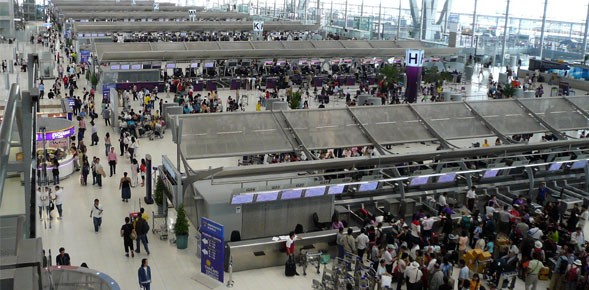With the number of annual air passengers set to increase to 7.3 billion by 2034, flight disruption is bound to become an increasingly expensive operational problem for airlines, airports and hotels to solve
New report from T2RL and Amadeus says flight disruption costs the travel industry some 8% of its global revenues every single year
With the number of annual air passengers set to increase to 7.3 billion by 2034, flight disruption is bound to become an increasingly expensive operational problem for airlines, airports and hotels to solve.
Bad weather, natural disasters and strike action cost the travel industry up to an estimated $60 billion annually, equating to some 8% of global industry revenues, a new report on flight disruption finds.
Shaping the Future of Airline Disruption Management, written by leading airline IT consultancy T2RL and commissioned by Amadeus, also finds that disruption spreads ‘virally’ throughout the travel ecosystem: the knock-on impact of planes and crews not arriving as intended means highly optimised networks see further cancellations and delays often from a relatively minor initial problem.
The report also finds that industry regulations such as the Tarmac Delay Rule in the US and Mandatory Compensation for Delays across the EU are incentivising airlines to develop standard procedures for handling disruption situations.
T2RL’s analysis for the report identified a range of findings based on interviews with leading experts from organisations across the travel industry, including American Express GBT, ANA, Gatwick Airport, IATA, Southwest Airlines, Star Alliance, Swiss International Airlines, and Yas Viceroy Hotel.
Other key findings include:
- We are heading for a technology breakthrough: Increased motivation of air-line boardrooms to invest in addressing disruption management combined with increasing attention and promising initial proof of concepts from IT vendors indicate a breakthrough is highly likely in coming years.
- Collaboration is critical to have an integrated approach: Better communication between operations managers, airports and airline service companies will lead to greater collaboration. In future, even airlines that compete vigorously will work together during times of disruption.
Ira Gershkoff, Principal Consultant, T2RL and the report’s author, commented: “There is every reason to believe the historic challenge of re-routing planes, crew and passengers during disruption will finally be addressed over the next several years. After a period of limited investment, the will has once again returned across airline boardrooms, driven in large part by the need to deliver reliably on ancillary product sales. What’s important is that service providers across the entire industry are collaborating to mitigate the impact on the traveller.”
Julia Sattel, Global Head of Airline IT, Amadeus, added: “Disruption management is one of the most significant operational challenges our airline customers face. Any inroad made into this $60 billion a year problem will yield substantial return on investment, not to mention addressing a frustration that tops passenger satisfaction surveys year after year. Needless to say, Amadeus technicians and engineers are working to solve the disruption management challenge right now.”
A panel of senior figures from across the industry discussed the report’s findings during a session at IATA’s World Passenger Symposium on Tuesday 18th October.
To download the report, please click here.
Theodore is the Co-Founder and Managing Editor of TravelDailyNews Media Network; his responsibilities include business development and planning for TravelDailyNews long-term opportunities.




![[PR] PR_Ascott and Vimut Hospital_2024](https://www.traveldailynews.asia/wp-content/uploads/2024/04/PR-PR_Ascott-and-Vimut-Hospital_2024-400x265.jpg)






























































